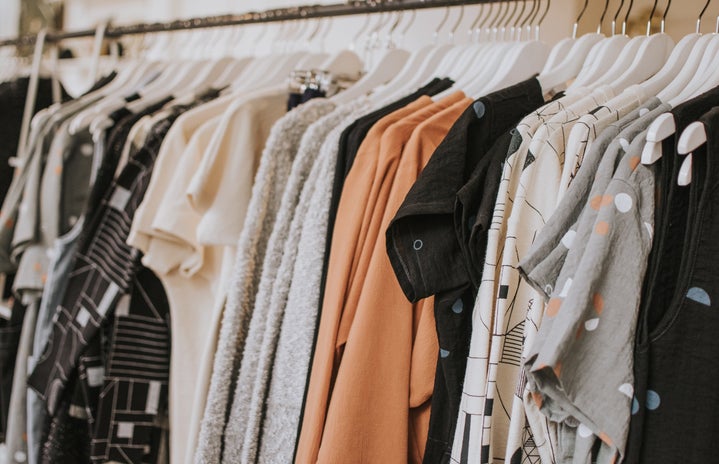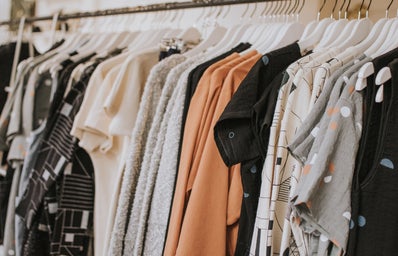Thrifting can be an exciting way to build a wardrobe while still being environmentally conscious and rejecting fast fashion. Kelly Kordom wrote an amazing article on being a sustainable shopper where the concepts of ‘slow’ and ‘fast’ fashion were explored. The second-hand clothing industry is so much grander than I could ever have imagined, with fast and slow fashion both playing a great role in the shear amount of clothing that is donated to become second-hand. However, most donated second-hand clothing ends up in Africa and for countries hoping to grow their textile industries this creates a problem. But, there is more to this story than just textile industries. This is about globalization, this is about self-expression, this is about livelihoods and this is about the environment.
Before we visit the East African countries that tried to push for either a ban or high tariffs on imported second-hand clothing, let me share some figures related to this ‘dilemma’. According to a research study by Katende-Magezi entitled ‘The impact of Second Hand Clothes and Shoes in East Africa’, 2.8 billion pounds (1.27 billion kilograms) are imported into Africa annually. Additionally, this equates to 70% of global donations ending up in Africa. The textile industry boomed between the 60s-80s, before economic liberalization, after which it declined. The East African countries that were pushing against the large scale of imports include Kenya, Rwanda, Uganda, Tanzania, South Sudan and Burundi.
COVID-19
The pandemic has introduced an interesting dynamic to this issue. After 2017, this issue seemed to be closed, in that East African countries would not pursue a ban on imported second-hand clothing (more on that later). However, COVID-19 saw the government putting in new measures to stay protected from the virus. In Kenya the ban on clothing imports was enacted but some were critical as the clothes are fumigated before arriving to the second-hand stalls. Nonetheless, it served as a form of enacting a mission that had been stunted previously. According to The EastAfrican, textile businesses in Kenya wish for the ban to continue.
Self-expression and quality
With little doubt, fashion serves as a means to express one’s personality and feel comfortable. According to Muringo and Kamwana in a 2020 New York Times article, Kenya is no exception. The second-hand markets are a place for many Kenyans to shop for clothing – clothing that serves as an extension of oneself, a form of self-expression. These markets provide quality and affordable clothes to the people of Kenya. Whereas in Karende-Magezi’s research new local and imported clothing is significantly more expensive. This study shows this to be the case in Kenya, Tanzania, Uganda, Rwanda and Burundi. For this reason, people opposed (and continue to oppose) the idea of a ban on second-hand clothing.
Jobs dependent
Cutting out second-hand market sales would have a tsunami effect for many of the East African and American jobs which are dependent on the global trade of these pre-loved items. People who run second-hand stalls in markets such as Gikomba, Nairobi, find it is significantly profitable. In a Guardian article, Kuria shares the potential impact of such an economic venture. By halting this import, business stalls will have to be shut down and steady streams of income will dry out. Many lives have been tied to these forms of income, and casual employees previously hired by Kuria will be left jobless. Then, according to figures presented in a New York Times article, 40 000 United States jobs are involved in the second-hand clothing process. Another factor that necessarily gets brought into the conversation when US second-hand clothing businesses push against the ban, is the impact on the environment. Should people in East Africa not buy the second-hand clothing, they will simply end up in landfills. This means that the root of the problem, the excessive consumption and production rooted in the fashion industry, is not tackled. Rather, Africa is expected to solve the environmental impact of the US’s waste alone.
State intervention
The trading of second-hand clothing between the USA and countries in East Africa is particularly interesting. The US has implemented a trade agreement called the African Growth and Opportunity Act (AGOA). This is a trade agreement between the US and certain African countries that secures trade between the two. When goods from these African countries enter the USA, they will be duty-free or have low tariffs – so long as these countries ‘comply’ with US expectations. These include buying imports that the US does not want (South African and US chicken ringing any bells?) and implementing political reforms. Kenya withdrew the proposition of placing high tariffs on imported second-hand clothing because of US pressure. More specifically, the USA was looking into removing East African countries from AGOA. To some, this is the West bullying those countries who depend on this trade for their economies to function. Local officials want their countries to grow the textile industry so that their own economies grow and to provide jobs, while some hold the opinion that wearing ‘hand-me-downs’ from the West compromises the dignity of the people wearing them.
There is so much more to second-hand clothing politics than just this pile. Bear in mind that the donated clothing is that which cannot be sold in these first world countries. But, there are so many lives involved in this issue. COVID-19 has introduced a ban on this trade, which may be considered controversial. Some people,such as Kamwana who owns her own fabric shop, see this as a way to think about integrating local designers and industry to grow local businesses and the economy. Others question the ban and the effect it has on their own businesses. But one thing that is certain is that this issue does not allow for an outright ban. Globalization has created an economic web difficult to untangle if one is not economically in control. This issue is complex – second-hand clothing donations are a double-edged blade.


